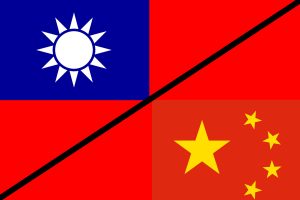AP World Update: Two Chinas Now?

In the months leading up to the AP World History exam, tenth graders throughout High School West are re-reading their AMSCOs and plowing through period 6: 1900 to the present. Remember the results of the Chinese Civil War? Did the United States recognize the Nationalists or the Communists? What happened several decades later? Let’s Recap.
The United States is well-known for condemning Communism throughout the world. In a land with freedom and justice for all, democratic values are at the foundation of the American governmental institution. The United States is oftentimes viewed as the world’s democratic superpower. However, despite being a nation founded on principles of liberty, the United States faced a dilemma when deciding “which China” to side with at the end of the Chinese Civil War.
In the 1940s, a civil war erupted in China. The Nationalists led by Chiang Kai-Shek fought the Communist Party of China led by Mao Zedong. At the end of the Chinese Civil War in 1949, the Nationalists accepted their defeat and settled in Taiwan while the Communists maintained the main Chinese land. After the war had ended, the United States had recognized Taiwanese leaders as the true leaders of China as Taiwan demonstrated that they were against the principles of communism.
However, decades later, President Nixon visited the People’s Republic of China and established trade deals with the country. Nixon even sat down with Communist leader Mao Zedong. In 1978 President Carter cut ties with Taiwan in favor of a “One China Policy.” The main concept of the One China Policy is that both China and Taiwan are one country ruled by the Communist People’s Republic of China. Despite there being a One China Policy, however, the United States continued to maintain informal trade relations with Taiwan.
Now hold up. History is in the making. For decades, this policy persisted and was left alone by U.S. leaders. However, as President-Elect in 2016, Trump answered a phone call from Taiwan’s President, Tsai Ing-Wen. Trump and Tsai discussed policy in the Asia-Pacific for ten minutes in December of 2016. Now, almost a year later in March of 2018, the Taiwan-China issue has found its way to the surface of Washington politics once again.
Trump and Tsai discussed policy in the Asia-Pacific for ten minutes in December of 2016. Now, almost a year later in March of 2018, the Taiwan-China issue has found its way to the surface of Washington politics once again.
On March 17, 2018, President Trump signed the Taiwan Travel Act: an act encouraging American officials to meet with Taiwanese leaders in Taiwan and for Taiwanese leaders to meet with American leaders in the United States. Taiwan responded with a statement that strongly supported the action. It stated that Taiwan would “continue to uphold the principles of mutual trust and mutual benefit to maintain close contact and communication with the U.S.”
Previous to the passage of the law, visits between the two nations had been strictly forbidden as the United States did not want to place its diplomatic and economic relations with the People’s Republic of China in danger. However, President Trump is willing to shake up international relations in the interests of economic benefit for the United States. Consequently, many nations and leaders throughout the world had responded to Trump’s actions and statements differently. While Taiwan applauded the United States with a supportive message, the People’s Republic of China was not very accepting of the terms of the travel act. Foreign Ministry Spokesman Lu Kang of the People’s Republic of China went as far as urging “the US side to correct its mistake.” In response to the American attempts to strengthen its relationship with Taiwan, a Chinese diplomat had threatened Taiwan with an invasion if the United States continued to take any more actions that recognized Taiwan outside of the power of the People’s Republic of China.
Despite disapproval of other leaders, President Trump has continued to carry out actions that recognize beacons of democracy in regions throughout the world. Earlier this year Trump had officially recognized the capital of Israel as Jerusalem. This had signaled a turning point in the relationship with the single democratic government on the Arabian Peninsula. Similarly, although Trump has not officially recognized Taiwan as a nation, he has signaled a shift toward improving the relationship with the “unrecognized” and “democratic” China. As time progresses, Americans, including AP World students, will be able to see how these new twenty-first century relationships unfold.
Now get back on Freemanpedia and read the Our World Stories to ace the AP Exam and acquire a plethora of knowledge to hold onto throughout your studies at Hills West and beyond.





